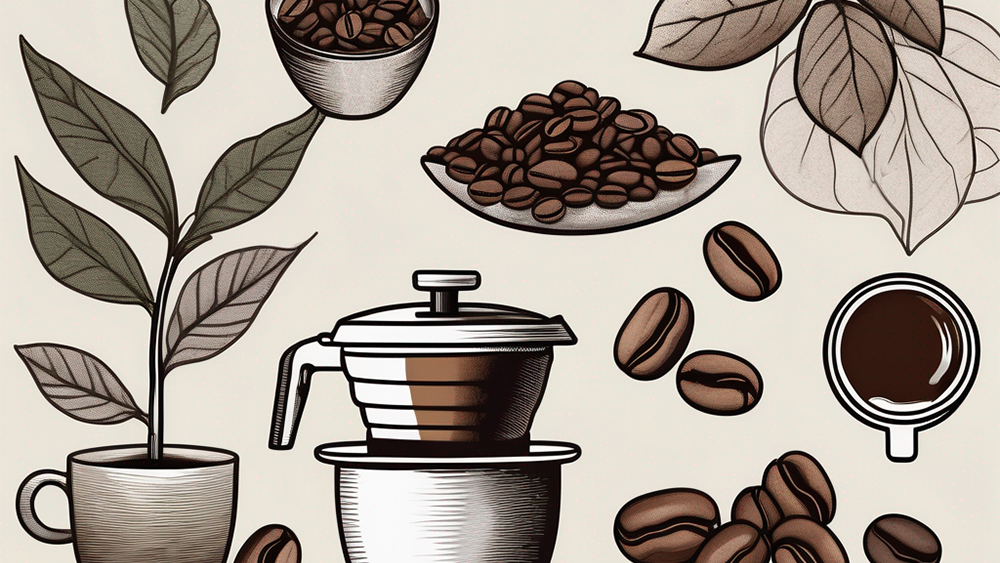Specialty Coffee: What It Is & Why It’s Worth It
I’ll be honest—when I first heard about specialty coffee, I didn’t think it was that big of a deal. I figured, coffee is coffee, right?
Wrong.
The first time I had a real specialty-grade coffee, I realized what I’d been missing. Instead of tasting like burnt bitterness, it was bright, clean, and packed with flavors I never expected—citrus, chocolate, berries. It wasn’t just good—it was next-level.
So, what exactly is specialty coffee? Why does it taste so much better? And how can you make sure you’re getting the best? Let’s break it down.
What Is Specialty Grade Coffee?
Specialty coffee isn’t just a fancy label—it’s a quality standard. To be considered “specialty grade,” coffee must score 80 points or higher on a 100-point scale during a professional tasting process called cupping. Every bean is judged on aroma, flavor, acidity, body, and aftertaste—meaning only the absolute best coffee makes the cut.
Here’s what sets specialty coffee apart:
✅ Grown at high elevations in ideal climates
✅ Handpicked at peak ripeness for maximum flavor
✅ Expertly processed and roasted to bring out its unique profile
✅ No defects or low-quality beans—only the top tier
If you’ve ever had a cup of coffee that made you stop and say, “Whoa, this is incredible”, chances are, it was specialty grade.
Why Specialty Coffee Matters
Beyond just being delicious, specialty coffee makes a huge impact on farmers, sustainability, and the coffee industry as a whole.
1. It Supports Small Farmers & Ethical Sourcing
Most specialty coffee comes from smallholder farmers who take incredible care in growing their crops. Unlike mass-produced commercial coffee (which prioritizes volume over quality), specialty-grade beans are cultivated with precision and passion—and that deserves fair pay.
When you buy specialty coffee from roasters who source ethically, you’re supporting:
✔️ Fair wages & better working conditions for farmers
✔️ Small farms that produce high-quality, sustainable coffee
✔️ Transparency in pricing & direct trade relationships
2. It’s Better for the Environment
Mass-produced coffee is often grown using methods that strip the land, deplete the soil, and contribute to deforestation. Specialty coffee, on the other hand, is often grown using shade-grown and regenerative farming practices, which:
✅ Preserve biodiversity & natural habitats
✅ Use fewer pesticides & synthetic fertilizers
✅ Promote long-term sustainability for future crops
3. It Tastes Infinitely Better
At the end of the day, the reason we drink coffee is flavor—and specialty coffee delivers. Whether it’s a natural-process Ethiopian bursting with berry notes or a smooth, chocolatey Guatemalan, specialty coffee offers a world of flavors you’ll never find in grocery store blends.
The Journey from Bean to Cup
Every great cup of specialty coffee starts with hardworking farmers and ends in your mug. Here’s how it gets there:
☕ Farming – Coffee is grown at high elevations in rich volcanic soil, where careful cultivation ensures the best possible flavors.
☕ Harvesting – Only ripe cherries are handpicked to ensure quality.
☕ Processing – Beans go through washed, honey, or natural processing to develop unique flavor profiles.
☕ Roasting – Specialty beans are roasted light to medium to highlight their natural characteristics (not burned to a crisp like commercial coffee).
☕ Brewing – Finally, you get to brew and enjoy the incredible work that’s gone into your cup.
How to Brew Specialty Coffee at Home
If you’re used to grocery store coffee, making the switch to specialty is a game changer—but you need to brew it right to get the full experience. Here’s what you need:
✅ A quality burr grinder – Fresh grinding your beans right before brewing makes a HUGE difference.
✅ Filtered water – Good coffee starts with good water.
✅ The right brewing method – Try pour-over, AeroPress, or French press to bring out the best flavors.
✅ Dial in your ratios – Start with a 1:15 coffee-to-water ratio and adjust to taste.
Pro Tip: If your coffee tastes too bitter, try grinding coarser. If it’s too sour, grind finer. Small adjustments make a big difference!
How to Find the Best Specialty Coffee
Not all coffee labeled “specialty” is created equal. Here’s how to ensure you’re getting the good stuff:
✔️ Look for single-origin or micro-lot coffee – These beans are sourced from specific farms or regions, ensuring higher quality and traceability.
✔️ Buy from reputable roasters – Grocery store coffee sits on shelves for months. Get it fresh from small-batch roasters who prioritize quality.
✔️ Check for roast date – Fresh is best! Look for coffee roasted within the last 2-4 weeks.
✔️ Read flavor notes – Specialty coffee comes in all sorts of flavor profiles—find one that matches your taste preferences.
Upgrade Your Coffee Game
If you’ve made it this far, you’re clearly someone who cares about great coffee—and we’re here to help you find it.
At Adventure Dog Coffee Co., we source high-quality, small-batch specialty coffee that’s roasted fresh and shipped straight to your door. No stale beans. No burnt roasts. Just damn good coffee that supports farmers and the environment.
Ready to taste the difference? Try one of our single-origin coffees today.

